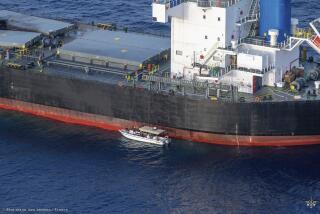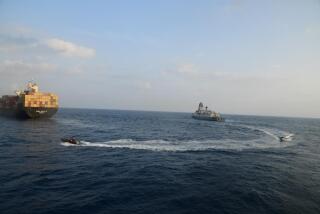Rocket Fuel for Iran Blocked by Customs : Shipment of Chemical Barred Pending Court Hearing Next Week
- Share via
WASHINGTON — The U.S. Customs Service, fighting intra-governmental resistance but meeting a Monday deadline in federal court, blocked for at least a week the shipment of a rocket-fuel component allegedly sought by Iran to propel about 300 missiles.
In an extraordinary move, the Justice Department turned over to Customs Service lawyers the duty of opposing a Tampa shipper’s bid to gain release of 286,000 pounds of ammonium perchlorate, seized last year from an Iranian freighter in Rotterdam, the Netherlands.
The chemical, now in short supply in the United States, is used as a rocket-fuel oxidizer in missiles ranging up to the giant MX.
Customs attorneys filed papers with U.S. District Judge Sim Lake in Houston, tying up shipment of the chemical until a hearing next Monday.
A State Department Rebuff
While the Justice Department was dropping out of the case--and refusing publicly to say why--the State Department was rebuffing the Customs Service on another front. It rejected a plea by Customs Commissioner William von Raab that a license to export the chemical be withdrawn.
Von Raab reacted angrily, saying in an interview: “The award for ‘insensitive bureaucrat of the week’ should go to the State Department because they are focusing on a lot of very questionable technical issues instead of the issue of this chemical going to a country with a history of terrorism.”
Von Raab said that mid-level State Department officials argued that the license was valid because the chemical was not yet in short supply when it was approved for export. The officials could not be reached for comment.
An attorney for the shipper, Girindus Corp. of Tampa, denied that his company was selling the chemical to Iran and called for its release.
‘Ayatollah Will Not Get It’
“The ayatollah (Iran’s leader, the Ayatollah Ruhollah Khomeini) will not get it if we get it back,” said attorney Robert T. Givens. He suggested that the chemical was intended for use by North Atlantic Treaty Organization forces in Europe.
But Von Raab maintained that the shipment was clearly headed for Iran. He said that it was seized with the help of Dutch authorities last year because it had been transferred from an American vessel to an Iranian ship.
“We have very good reason to believe this stuff was going to Iran,” said Von Raab, an appointee of former President Ronald Reagan who is controversial for his outspokenness.
“We know that from the shipping documents when it was sitting in the Netherlands,” he continued. “The same parties are now involved, and it doesn’t take a lot of genius to figure out where it will wind up if it is released.”
Givens charged that Customs has an “acute interest” in the case because it “now faces the extreme embarrassment of public exposure of the fact that the seizure was not the triumph of Customs over evil as initially reported” in a Customs publication.
“Instead, it was only bureaucratic bumbling after all,” Givens added in a letter to The Times, following disclosure of the controversy Sunday. “Any purported Customs interest in ‘national security’ at this time rings hollow, in view of the embarrassment factor.”
Illegally Seized
Two weeks ago, Judge Lake ruled that the chemical would have to be released to Girindus on Monday unless the government filed papers demanding that the shipment be forfeited to the government. Customs attorneys filed the documents, alleging that the shipper’s bill of lading in January, 1988, gave a false destination of Basel, Switzerland.
In his ruling March 9, Lake found tentatively that the shipment had been illegally seized by Customs, even if it was being diverted to Iran. The judge said that the government had not offered evidence of any such diversion.
Lake declared that the Customs Service had no legal authority to seize the shipment because ammonium perchlorate, in its pure form, is not on the list of weapons-related items requiring a special license from the State Department before it can be sold.
U.S. officials concede that the chemical was not on the munitions list in 1988 when it was shipped from Houston to Rotterdam, although the Customs Service, at least, maintains that it has since been added.
Von Raab argued that the license should be considered “on the basis of today’s situation, not on what was done some time ago. We say cut through all the red tape and cancel the license because today we wouldn’t have granted it.
“I don’t think it’s a very good idea for us to be providing the Iranians with military chemicals.”
After learning of Customs’ forfeiture move, Givens said that it “was unprecedented, to my knowledge” for the agency to take over a case from the Justice Department. “It sounds like a kamikaze flight to me.”
Times staff writer J. Michael Kennedy in Houston contributed to this story.
More to Read
Sign up for Essential California
The most important California stories and recommendations in your inbox every morning.
You may occasionally receive promotional content from the Los Angeles Times.













